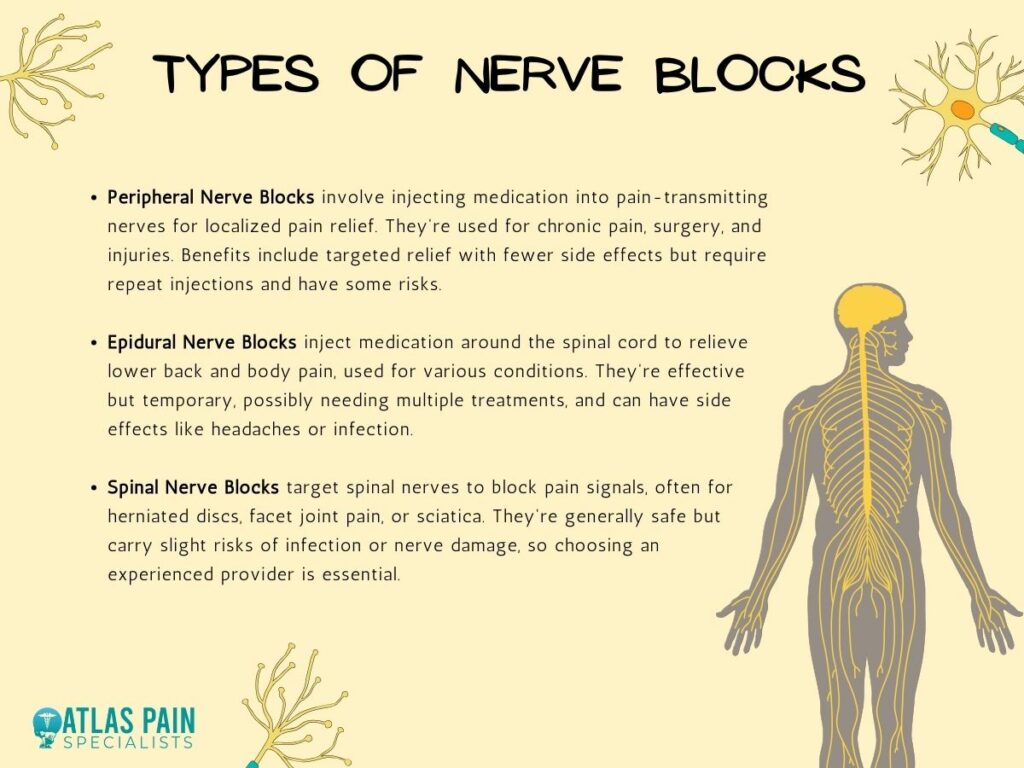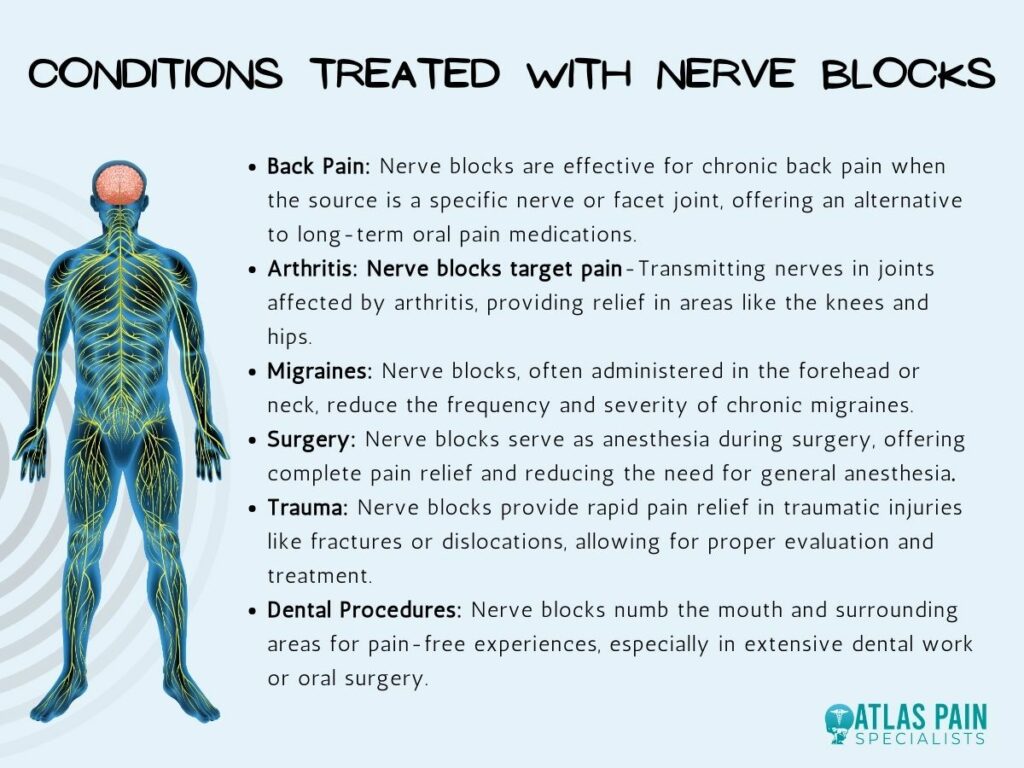

Nerve Blocks for Pain Management: What You Need to Know
Nerve blocks for pain management are a popular method involving injecting a local anesthetic or steroid into the nerve tissue to block the transmission of pain signals to the brain
This technique is commonly used in surgery, dentistry, and pain management for chronic conditions. In this blog, we will explore the basics of nerve blocks, including how they work, their benefits and risks, and what you need to know before undergoing a nerve block procedure.
Types of Nerve Blocks
When it comes to managing pain, there's no one-size-fits-all solution. One effective method that healthcare professionals often turn to is nerve blocks. These specialized procedures target the source of pain, providing relief and improving your quality of life.
Below are the three common types of nerve blocks

Peripheral Nerve Blocks
Peripheral nerve blocks involve injecting medication, often a local anesthetic, directly into the nerves responsible for transmitting pain signals.
Their purpose is clear: to block those pain signals. Doing so provides localized pain relief, making it especially useful for specific pain conditions.
Peripheral nerve blocks are versatile and can be used to manage a wide range of conditions, such as:
- Chronic Pain: Often used for conditions like chronic back pain, arthritis, and nerve-related disorders.
- Surgery: Sometimes administered as anesthesia to reduce pain during and after surgery.
- Injury: For acute pain resulting from injuries like fractures or dislocations.
Below are the benefits and limitations of peripheral nerve blocks:
- Benefits: Peripheral nerve blocks offer targeted pain relief with fewer systemic side effects compared to oral pain medications. They allow patients to avoid the grogginess or nausea associated with some pain medications.
- Limitations: While highly effective, peripheral nerve blocks are temporary and require repeat injections for long-term pain management. They also carry some risks, such as infection or nerve damage, which should be discussed with your healthcare provider.
Epidural Nerve Blocks
An epidural nerve block involves injecting medication into the epidural space, the area around the spinal cord. This nerve block primarily targets the lower back and body, relieving pain and relaxing muscles.
Epidural nerve blocks are commonly used during labor and childbirth to manage pain, but they have various other applications too:
- Chronic Back Pain: For long-term relief from conditions like herniated discs or spinal stenosis.
- Postoperative Pain: To alleviate pain after certain surgeries, like spinal surgery or abdominal procedures.
- Neuropathic Pain: Sometimes used for nerve-related pain, like sciatica.
Below are some considerations for epidural nerve blocks
- Effectiveness: Epidural nerve blocks are highly effective for targeted pain relief.
- Temporary: Unlike peripheral nerve blocks, epidurals offer temporary relief and may require multiple treatments.
- Potential Side Effects: While generally safe, epidurals can have side effects like headache or infection. Discuss these with your healthcare provider.
Spinal Nerve Blocks
Spinal nerve blocks target specific spinal nerves with medication to block pain signals. They are typically administered in the neck or back area, depending on the source of pain.
Spinal nerve blocks are often used to manage conditions such as:
- Herniated Discs: When a disc presses on a nerve, causing severe pain.
- Facet Joint Pain: Arthritis or injury can lead to pain in the spine's facet joints.
- Sciatica: Nerve compression in the lower back, causing leg pain.
Below are the potential risks and side effects:
- Infection: As with any medical procedure, there is a small risk of infection.
- Nerve Damage: While rare, there is a slight nerve damage risk, so choosing an experienced provider is crucial.
How Nerve Blocks Work
Nerve blocks are essential to pain management, providing much-needed relief for those suffering from chronic or acute pain. Below is how nerve blocks work, their mechanism of action, and the conditions they effectively treat.
Mechanism of Action
Nerve blocks, a powerful tool in pain management, offer rapid relief by intercepting pain signals. Learn how they function and the varying durations of pain relief they provide, tailored to your specific needs.
Blocking Pain Signals
Nerve blocks operate by interrupting the transmission of pain signals. When you experience pain, your nerves send signals to your brain, alerting you to the discomfort.
Nerve blocks work by numbing or blocking these pain signals at the source, typically using a local anesthetic. Doing so provides immediate relief and allows you to regain comfort and mobility.
Duration of Pain Relief
The duration of pain relief provided by nerve blocks can vary. Some blocks offer short-term relief, lasting hours to a few days, while others can provide relief for weeks or even months.
It depends on the type of block used and the specific condition being treated. Your healthcare provider will discuss the expected duration of pain relief based on your unique situation.
Anesthesia vs. Analgesia
Understanding the difference between anesthesia and analgesia is essential when discussing nerve blocks.
Anesthesia
When a nerve block is used as anesthesia, it's often administered before surgical procedures to block all sensation in the targeted area completely. This ensures the patient feels no pain during the operation. Epidural and spinal nerve blocks are commonly used for this purpose.
Analgesia
On the other hand, nerve blocks used for analgesia provide pain relief while allowing you to remain conscious and alert. This is often the case with peripheral nerve blocks used for managing chronic pain conditions, such as back pain, arthritis, and migraines.
Analgesic nerve blocks help alleviate pain without the need for systemic medications, which can have unwanted side effects.
Preparing for a Nerve Block Procedure
Before undergoing a nerve block procedure, there are a few essential steps to consider:
- Consultation: Schedule a consultation with a pain specialist or healthcare provider. They will assess your medical history, perform a physical examination, and discuss the potential benefits and risks of the procedure.
- Medication Review: Inform your healthcare provider about any medications you take, including over-the-counter drugs and supplements. They may need to adjust your medication regimen before the procedure.
- Informed Consent: Make sure you understand the procedure, including its purpose, risks, and expected outcomes. Ask any questions you may have and provide informed consent.
Conditions Treated with Nerve Blocks
Nerve blocks offer a targeted solution to many painful conditions, from chronic back pain and arthritis to debilitating migraines. Moreover, they are crucial in acute pain management during surgeries, trauma cases, and even dental procedures.
In this segment, we'll explore the diverse conditions that find solace in the precision of nerve block treatments.

Chronic Pain Conditions
- Back Pain: Nerve blocks can provide effective relief for chronic back pain, especially when the source of pain is identified as a specific nerve or facet joint. These blocks can be an excellent alternative to long-term oral pain medications.
- Arthritis: Individuals with arthritis, whether in the knees, hips, or other joints, can benefit from nerve blocks. These blocks target the nerves responsible for transmitting pain signals from inflamed joints.
- Migraines: Chronic migraines can be debilitating, but nerve blocks, often administered in the forehead or neck area, can significantly reduce the frequency and severity of migraine attacks.
Acute Pain Management
- Surgery: Nerve blocks are commonly used as anesthesia during surgery, offering complete pain relief during the procedure and minimizing the need for general anesthesia.
- Trauma: In cases of traumatic injuries, such as fractures or dislocations, nerve blocks can provide rapid pain relief, allowing for proper medical evaluation and treatment.
- Dental Procedures: For some dental procedures, especially those involving extensive work or oral surgery, nerve blocks can be used to numb the mouth and surrounding areas, ensuring a pain-free experience.
Navigating Nerve Blocks
Nerve blocks offer a ray of hope for those grappling with pain, providing targeted relief that can be life-changing. However, like any medical procedure, they come with both benefits and risks.
Benefits of Nerve Blocks
Discover how nerve blocks offer an innovative approach to pain management by delivering targeted relief exactly where needed, sparing you from the potential side effects of systemic medications and the risk of opioid dependency. In this section, we'll delve into the advantages of this precision-focused technique.
- Targeted Pain Relief: One of the primary advantages of nerve blocks is their precision. Unlike oral pain medications that affect the entire body, nerve blocks specifically target the source of pain. This precision means you experience relief where you need it most, minimizing the discomfort and improving your overall quality of life.
- Avoidance of Systemic Medications: Nerve blocks can provide effective pain relief without systemic medications. This is particularly valuable for individuals who may experience adverse side effects or drug interactions with oral pain medications. It also reduces the risk of developing a dependency on opioids, which can be a concern with some chronic pain conditions.
Risks and Potential Complications
While nerve blocks offer targeted pain relief, being aware of potential risks and complications is crucial. In this section, we'll explore the rare but significant factors to consider, such as allergic reactions, infection, and the importance of selecting a skilled healthcare provider.
- Allergic Reactions: Although rare, allergic reactions to the medications used in nerve blocks can occur. It's essential to discuss any known allergies with your healthcare provider before the procedure. They can take precautions to minimize the risk and have appropriate treatments if needed.
- Infection: As with any invasive medical procedure, there is a small risk of infection. To minimize this risk, healthcare providers take strict measures to maintain a sterile environment during nerve block procedures.
- Nerve Damage: While uncommon, nerve damage is a potential complication of nerve blocks. Choosing an experienced and skilled healthcare provider to perform the procedure is essential. They will use imaging guidance and take great care to avoid damaging nearby nerves.
Patient Considerations
Not everyone may be eligible for nerve block procedures. Patient eligibility depends on various factors, including the specific condition being treated, medical history, and the patient's overall health. Your healthcare provider will assess your eligibility during a thorough consultation.
Discussing Options with Your Healthcare Provider
Before deciding on a nerve block procedure, having an open and informed discussion with your healthcare provider is crucial. This conversation should cover:
- Your medical history, including allergies and current medications.
- A thorough explanation of the procedure, its purpose, and expected outcomes.
- The risks and potential complications associated with the specific nerve block.
- Alternative treatment options, if applicable, and their pros and cons.
- Your goals and expectations regarding pain relief.
Questions to Ask Before Getting a Nerve Block
As a patient, you should feel empowered to ask questions and seek clarity on any concerns. Here are some important questions to consider:
- Why is a nerve block recommended for my condition?
- What are the expected benefits and duration of pain relief?
- What are the potential risks and complications specific to my situation?
- Are there alternative treatments or medications I should explore?
- What is the experience and expertise of the healthcare provider performing the procedure?
- What is the recovery process like, and what should I expect afterward?
Conclusion
Nerve blocks are a valuable tool in pain management, offering targeted relief and improved quality of life for those suffering from chronic or acute pain. While they come with distinct benefits like precise pain relief and reduced reliance on systemic medications, it's essential to be aware of potential risks and complications.
Open communication with your healthcare provider, thoroughly considering your options, and asking pertinent questions are key to making informed decisions about nerve block procedures. Ultimately, these procedures have the potential to provide much-needed relief and enhance your overall well-being.
About Dr. Sean Ormond



